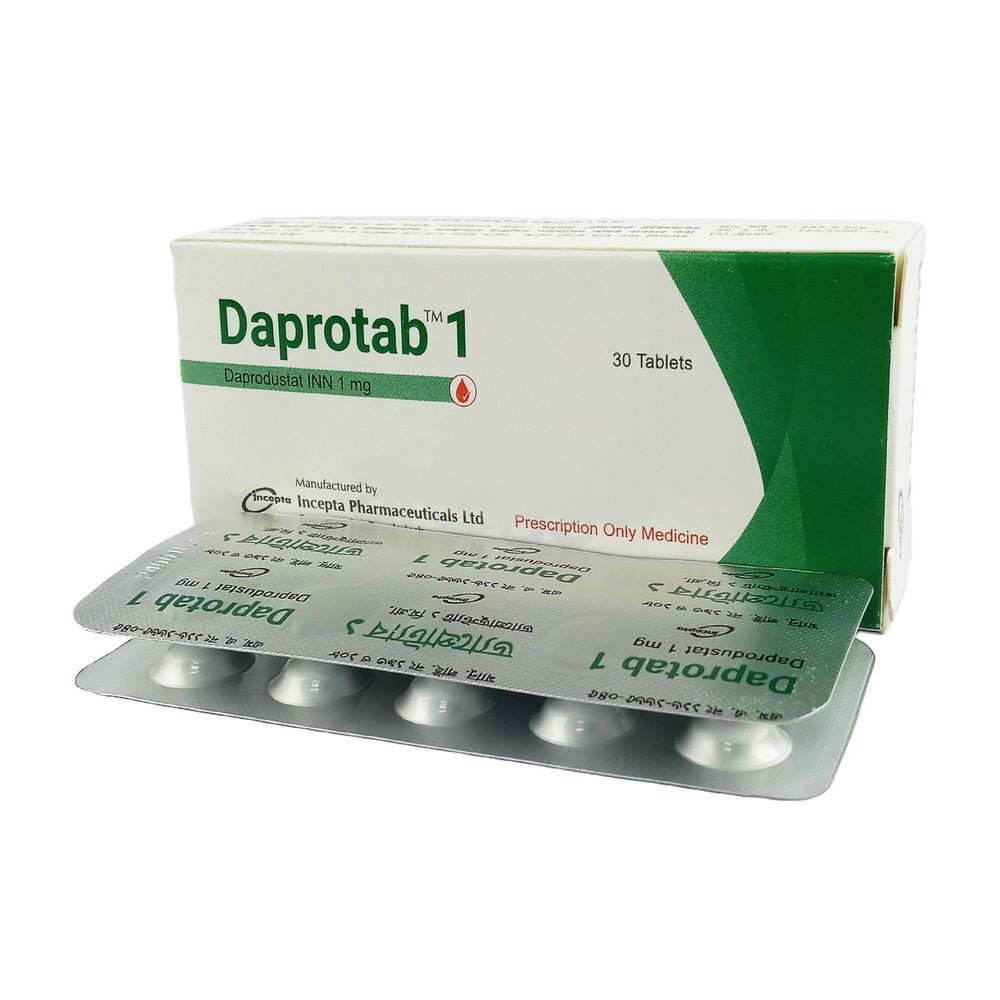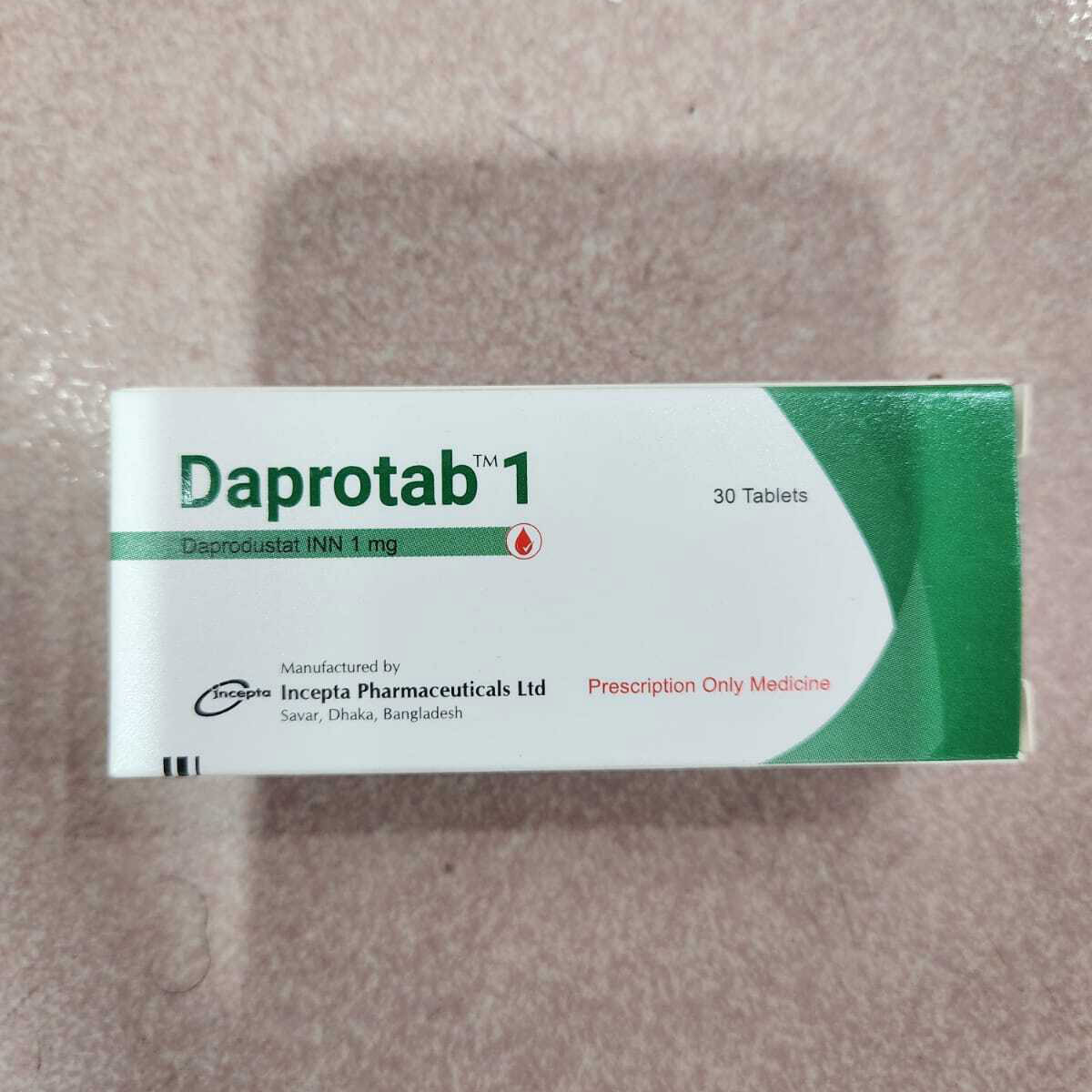Unit Price:
৳ 25.00
(3 x 10: ৳ 750.00)
Strip Price:
৳ 250.00
Also available as:
Indications
Daprotab is indicated for the treatment of anemia due to chronic kidney disease (CKD) in adults who have been receiving dialysis for at least four months.
Daprotab is not indicated for use:
Daprotab is not indicated for use:
- As a substitute for red blood cell transfusions in patients who require immediate correction of anemia.
- For treatment of anemia of chronic kidney disease in patients who are not on dialysis.
* রেজিস্টার্ড চিকিৎসকের পরামর্শ মোতাবেক ঔষধ সেবন করুন
Pharmacology
Daprodustat is a hypoxia-inducible factor, prolyl hydroxylase inhibitor (HIF-PHI). The activity of HIF-PH enzymes controls intracellular levels of HIF, a transcription factor that regulates the expression of genes involved in erythropoiesis. Activation of the HIF pathway is important in the adaptive response to hypoxia to increase red blood cell production. Through the reversible inhibition of HIF-PH, Daprodustat stimulates a coordinated erythropoietic response that includes the increase of plasma endogenous erythropoietin (EPO) levels, regulation of iron transporter proteins and reduction of hepcidin (an iron regulator protein that is increased during inflammation in CKD). This results in improved iron bioavailability, increased Hb production and increased red cell mass.
Dosage & Administration
Pre-Treatment and On-Treatment Evaluations of Anemia, Iron Stores, and Liver Tests
Evaluation of Anemia and Iron Stores: Correct and exclude other causes of anemia (e.g„vitamin deficiency, metabolic or chronic inflammatory conditions, bleeding) before initialing Daprodustat, Evaluate the iron status in all patients before and during treatment with Daprodustat. Administer supplemental iron therapy when serum ferritin is less than 100 mcg/mL or when serum transferrin saturation is less than 20%. The majority of patients with CKD will require supplemental iron during the course of therapy.
Liver Testing: Assess serum alanine aminotransferase (ALT), aspartate aminotransferase (AST), alkaline phosphatase, and total bilirubin prior to initiation of Daprodustat. Repeat the liver tests if the patient develops signs or symptoms that could be consistent with liver disease during treatment with Daprodustat.
Important Dosing Information: Individualize dosing and use the lowest dose of Daprodustat sufficient to reduce the need for red blood cell transfusions. Do not target a hemoglobin higher than 11 g/dL. Daprodustat can be taken with or without food, and without regard to concomitant administration of iron or phosphate binders. Daprodustat should be swallowed whole. Tablets should not be cut, crushed, or chewed. Daprodustat can be administered without regard to the timing or type of dialysis, if a dose of Daprodustat is missed, it should be taken as soon as possible, unless it is the same day as the next dose. In this case, the missed dose should be skipped, and the next dose taken at the usual time. Double-doses should not be taken to make-up for a missed dose.
Recommended Starting Dose of Daprodustat: Adults with Anemia Due to Chronic Kidney Disease Receiving Dialysis for at least 4 Months
Adults Not Being Treated with an ESA: For adults not being treated with an ESA, the starting dose of Daprodustat is based on the hemoglobin level. Dose modifications are needed for patients receiving concomitant treatment with a moderate CYP2C8 inhibitor or moderate hepatic impairment.
Monitoring Response to Therapy and Dose Adjustment: Following initiation of therapy and after each dose adjustment, monitor hemoglobin every 2 weeks for the first month and then every 4 weeks thereafter. When adjusting doses of Daprodustat, consider hemoglobin rate of rise, rate of decline and hemoglobin variability. Do not increase the dose of Daprodustat more frequently than once every 4 weeks.
Dosage Modification for Concomitant Treatment with Moderate CYP2C8 Inhibitors: Reduce the starting dose of Daprodustat by half in patients who are on clopidogrel or a moderate CYP2C8 inhibitor except in patients whose starting dose is already 1 mg. Monitor hemoglobin and adjust the dose of Daprodustat when initiating or stopping therapy with clopidogrel or a moderate CYP2C8 inhibitor during treatment with Daprodustat.
Evaluation of Anemia and Iron Stores: Correct and exclude other causes of anemia (e.g„vitamin deficiency, metabolic or chronic inflammatory conditions, bleeding) before initialing Daprodustat, Evaluate the iron status in all patients before and during treatment with Daprodustat. Administer supplemental iron therapy when serum ferritin is less than 100 mcg/mL or when serum transferrin saturation is less than 20%. The majority of patients with CKD will require supplemental iron during the course of therapy.
Liver Testing: Assess serum alanine aminotransferase (ALT), aspartate aminotransferase (AST), alkaline phosphatase, and total bilirubin prior to initiation of Daprodustat. Repeat the liver tests if the patient develops signs or symptoms that could be consistent with liver disease during treatment with Daprodustat.
Important Dosing Information: Individualize dosing and use the lowest dose of Daprodustat sufficient to reduce the need for red blood cell transfusions. Do not target a hemoglobin higher than 11 g/dL. Daprodustat can be taken with or without food, and without regard to concomitant administration of iron or phosphate binders. Daprodustat should be swallowed whole. Tablets should not be cut, crushed, or chewed. Daprodustat can be administered without regard to the timing or type of dialysis, if a dose of Daprodustat is missed, it should be taken as soon as possible, unless it is the same day as the next dose. In this case, the missed dose should be skipped, and the next dose taken at the usual time. Double-doses should not be taken to make-up for a missed dose.
Recommended Starting Dose of Daprodustat: Adults with Anemia Due to Chronic Kidney Disease Receiving Dialysis for at least 4 Months
Adults Not Being Treated with an ESA: For adults not being treated with an ESA, the starting dose of Daprodustat is based on the hemoglobin level. Dose modifications are needed for patients receiving concomitant treatment with a moderate CYP2C8 inhibitor or moderate hepatic impairment.
Monitoring Response to Therapy and Dose Adjustment: Following initiation of therapy and after each dose adjustment, monitor hemoglobin every 2 weeks for the first month and then every 4 weeks thereafter. When adjusting doses of Daprodustat, consider hemoglobin rate of rise, rate of decline and hemoglobin variability. Do not increase the dose of Daprodustat more frequently than once every 4 weeks.
- If the dose of Daprodustat needs to be adjusted, increase or decrease by one dose level at a time.
- Decrease the dose of Daprodustat if hemoglobin increases rapidly (e.g., greater than 1 g/dL over 2 weeks or greater than 2 g/dL over 4 weeks) or if the hemoglobin exceeds 11 g/dL.
- If hemoglobin exceeds 12 g/dL, interrupt treatment with Daprodustat, When the hemoglobin is within the target range, treatment may be restarted at one dose level lower.
- Treatment with Daprodustat should not be continued beyond 24 weeks of therapy if a clinically meaningful increase in hemoglobin level is not achieved. Alternative explanations for an inadequate response should be sought and treated before re-starting therapy.
Dosage Modification for Concomitant Treatment with Moderate CYP2C8 Inhibitors: Reduce the starting dose of Daprodustat by half in patients who are on clopidogrel or a moderate CYP2C8 inhibitor except in patients whose starting dose is already 1 mg. Monitor hemoglobin and adjust the dose of Daprodustat when initiating or stopping therapy with clopidogrel or a moderate CYP2C8 inhibitor during treatment with Daprodustat.
* রেজিস্টার্ড চিকিৎসকের পরামর্শ মোতাবেক ঔষধ সেবন করুন
Interaction
CYP2C8 Inhibitors: Concomitant administration of strong CYP2C8 inhibitors (e.g., gemfibrozil) with Daprotab is contraindicated due to a marked increase in Daprotab exposure.
CYP2C8 Inducers: CYP2C8 inducers (e.g., rifampin) may decrease Daprotab exposure, which may result in loss of efficacy.
CYP2C8 Inducers: CYP2C8 inducers (e.g., rifampin) may decrease Daprotab exposure, which may result in loss of efficacy.
Contraindications
- Receiving a strong CYP2C8 inhibitor such as gemfibrozil.
- With uncontrolled hypertension.
Side Effects
- Risk of hospitalization due to heart failure
- High blood pressure
- Damage to the lining of the stomach, the tube that connects the mouth and stomach (esophagus), and intestines (gastrointestinal erosion).
Pregnancy & Lactation
May cause fetal harm. Breastfeeding not recommended until one week after the final dose.
Precautions & Warnings
- Increased Risk of Death, Myocardial Infarction, Stroke, Venous Thromboembolism, & Thrombosis of Vascular Access
- Risk of Hospitalization for Heart Failure
- Hypertension
- Gastrointestinal Erosion
- Serious Adverse Events in Patients with Anemia Due to Chronic Kidney Disease and Not on Dialysis
- Malignancy
Use in Special Populations
Use in children: It is not known if Daprostat is safe and effective in children.
Overdose Effects
Headache and gastrointestinal adverse reactions (e.g., nausea) may be seen with acute overdose with Daprotab. There is no specific antidote. Hemodialysis will not substantially remove Daprotab because it is highly protein bound.
Storage Conditions
Store below 30°C, in a cool and dry place. Keep away from light. Keep all the medicine out of the reach of children.
Pack Images: Daprotab 1 mg Tablet


